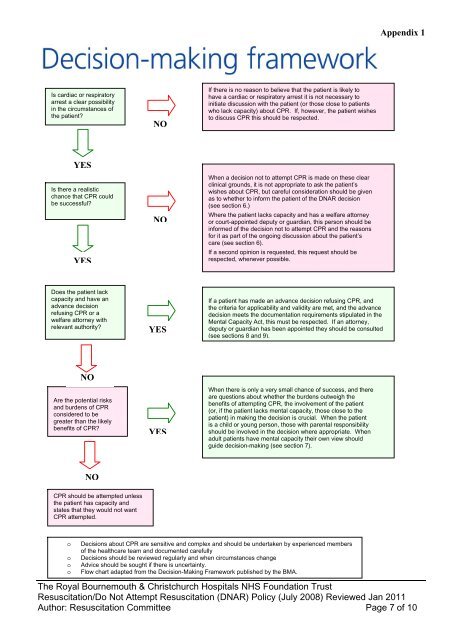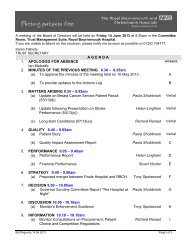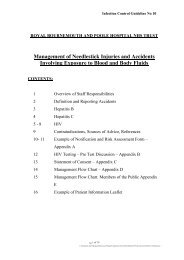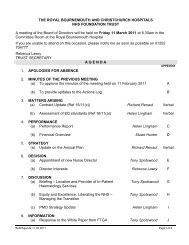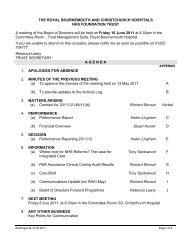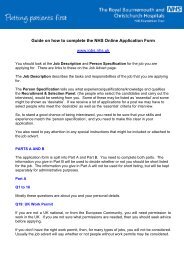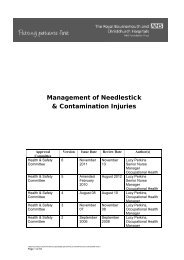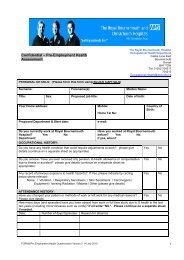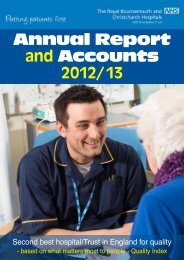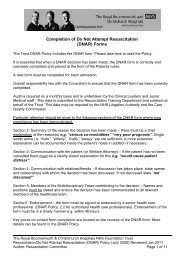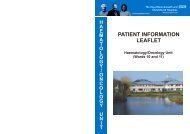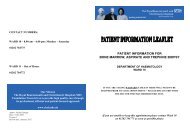resuscitation/do not attempt resuscitation (dnar) policy - Royal ...
resuscitation/do not attempt resuscitation (dnar) policy - Royal ...
resuscitation/do not attempt resuscitation (dnar) policy - Royal ...
- No tags were found...
Create successful ePaper yourself
Turn your PDF publications into a flip-book with our unique Google optimized e-Paper software.
Appendix 1Is cardiac or respiratoryarrest a clear possibilityin the circumstances ofthe patient?NOIf there is no reason to believe that the patient is likely tohave a cardiac or respiratory arrest it is <strong>not</strong> necessary toinitiate discussion with the patient (or those close to patientswho lack capacity) about CPR. If, however, the patient wishesto discuss CPR this should be respected.YESIs there a realisticchance that CPR couldbe successful?YESNOWhen a decision <strong>not</strong> to <strong>attempt</strong> CPR is made on these clearclinical grounds, it is <strong>not</strong> appropriate to ask the patient’swishes about CPR, but careful consideration should be givenas to whether to inform the patient of the DNAR decision(see section 6.)Where the patient lacks capacity and has a welfare attorneyor court-appointed deputy or guardian, this person should beinformed of the decision <strong>not</strong> to <strong>attempt</strong> CPR and the reasonsfor it as part of the ongoing discussion about the patient’scare (see section 6).If a second opinion is requested, this request should berespected, whenever possible.Does the patient lackcapacity and have anadvance decisionrefusing CPR or awelfare attorney withrelevant authority?YESIf a patient has made an advance decision refusing CPR, andthe criteria for applicability and validity are met, and the advancedecision meets the <strong>do</strong>cumentation requirements stipulated in theMental Capacity Act, this must be respected. If an attorney,deputy or guardian has been appointed they should be consulted(see sections 8 and 9).NOAre the potential risksand burdens of CPRconsidered to begreater than the likelybenefits of CPR?YESWhen there is only a very small chance of success, and thereare questions about whether the burdens outweigh thebenefits of <strong>attempt</strong>ing CPR, the involvement of the patient(or, if the patient lacks mental capacity, those close to thepatient) in making the decision is crucial. When the patientis a child or young person, those with parental responsibilityshould be involved in the decision where appropriate. Whenadult patients have mental capacity their own view shouldguide decision-making (see section 7).NOCPR should be <strong>attempt</strong>ed unlessthe patient has capacity andstates that they would <strong>not</strong> wantCPR <strong>attempt</strong>ed.ooooDecisions about CPR are sensitive and complex and should be undertaken by experienced membersof the healthcare team and <strong>do</strong>cumented carefullyDecisions should be reviewed regularly and when circumstances changeAdvice should be sought if there is uncertainty.Flow chart adapted from the Decision-Making Framework published by the BMA.The <strong>Royal</strong> Bournemouth & Christchurch Hospitals NHS Foundation TrustResuscitation/Do Not Attempt Resuscitation (DNAR) Policy (July 2008) Reviewed Jan 2011Author: Resuscitation Committee Page 7 of 10


